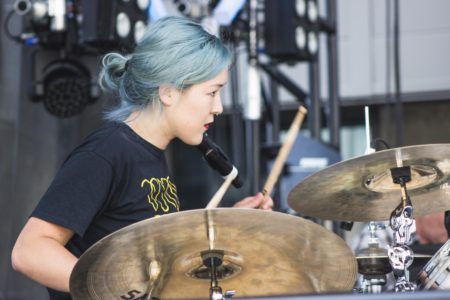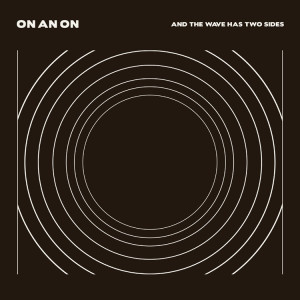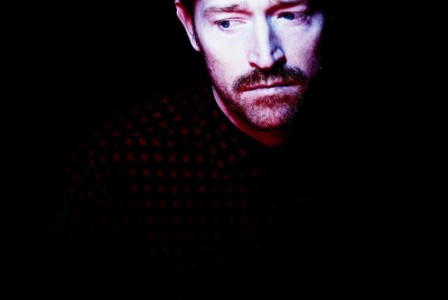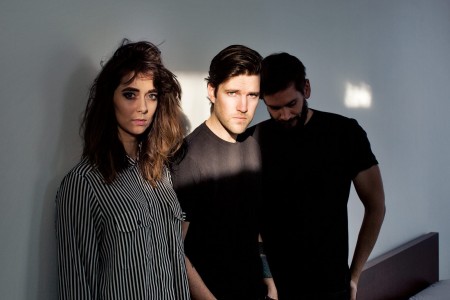Northern Transmissions Interviews On An On

Minneapolis / Chicago band ON AN ON have made big waves in 2013, following the release of their debut album, “Give In” in March. With two trips to Europe and numerous stops at major music festivals – Bonnaroo and Governor’s Ball among the noted – the band is currently in the midst of its first North American headlining tour. Jeffrey Powell caught up with lead singer Nate Eiesland on the eve of the band’s show at the Media Club in Vancouver.
JP: You were here in Vancouver just a few months ago with Junip. At that show you’d gotten on stage with opener Barbarossa (solo project of James Mathé, also a member of Junip) to perform the song “Turbine”. How’d that come about?
NE: We’re good buddies with them. We started talking about our favorite songs in our own band’s sets. I was talking about a pedal that I had and he’d said it sounded a lot like the effect on that particular song (“Turbine”). So, he asked if I wanted to sit in on this song and we just went for it.
JP: Did you perform with him in other cities on that tour?
NE: It happened late in the game. It was in Vancouver and then I think the next show. But Vancouver was toward the end of that tour.
JP: Is that something you look forward to? Having those conversations with other musicians and exploring those kinds of opportunities?
NE: Absolutely, I look forward to those moments. That’s the part of touring that’s alive and spontaneous; when you’re meeting likeminded people and you’re able to cross-pollinate. It’s an exciting thing. I’d never done that song before. I’d learned that riff two hours prior and all of a sudden we’re playing to hundreds of people. In a good way, it’s way more nerve racking to play that because you’re rehearsing your own set for weeks.
JP: On your album, “Give In,” you worked with producer Dave Neufeld (Broken Social Scene, Super Furry Animals) and have spoken very highly of him in other interviews. How long had you been a fan?
NE: I think we’d learned relatively late in the game what his role was on those records. We were Broken Social Scene fans back growing up in high school, and then we found out later, when were a serious band and thinking about working with a real producer. When his name came up and the roster of acts that he’d worked with, we were all behind the opportunity to work with him. When he agreed to be a part of making this record, we were all in.
JP: A recurring thing that came up when discussing his role with your record was the many journeys that you went on as part of the recording process. Do you have any memorable anecdotes of exploring the songs on the album?
NE: Not necessarily a song, but more so a perspective. He created an environment that was really healthy for us to make art. I think we had grown up self-producing, making our own albums, and we’d just formed our own ideas on what’s good and what’s the process. We’d never worked with someone who’d worked through those times and who’d been a part of making that music and been a part of that scene. It was really informative. He’d have all these seminal records that, when you’d bring up an idea, when you’re thinking of this band that did this and was satisfying to you from the last 10 years; he’d pull out a record that was 60 years old.
Moments like that, you get to go back and get inspired by the people who were among the first to discover something. And, we tried to go from that place and not make something that really just got inspired from something that was done five-ten times down the line because it’s been done and re-done. We wanted to make something new and there’s nothing new under the sun. So, we thought – let’s gather what we love and find the purest forms of that and see what comes out. We just followed our instincts.
On another occasion, we were tracking a guitar part for which I’d had an idea. I laid it down over a few takes, and on the last take I really felt like I’d nailed it. He had me come into the control room for playback and he said “so hear me out on this, but I like the first take best”. And, I was kind of surprised because I felt so much more confidence on the last take. But he said “there’s a kind of nervousness and tension in that first take because you’d never done it before. There’s a thing that’s happening; all the notes are there and the attitude’s there, but there’s vulnerability in the first take that wasn’t there in the last one, which was more confident and realized. There’s more raw, pulsating energy coming from something a little more out of your control.”
That opened up all of our eyes; that we wanted to make a record with moments full of things like that. We didn’t want to catch all of our ideas perfectly and precisely; we wanted to capture some of the discovery along the way and try and showcase it. So, I think the record has some vulnerability in it that gets showcased, and it became a real core value for the whole band.
JP: When you say it was eye opening, has that now made you more self-aware?
NE: It became a shift and a priority change for me. Up until then we were self-producing and young. Growing up, you wanted to be taken seriously and seen as a good musician and nailing your parts on the first take. As I’ve gotten older though, I’ve realized that that’s not that interesting on tape. It doesn’t make a good album. Maybe it’s good for self-inflation but not necessarily for good art. So it was important for me to realize that you can capture the discovery and capture the spark. That’s what makes something that I, at least, am drawn to in music and something that I want to make.
JP: You’ve expressed in the past the importance for you to poeticize your feelings as a means of therapy to get you through some particularly tough times that you’ve been through. Do you put a lot of pressure on yourself to articulate yourself in a way that you’re happy with?
NE: For myself, I’ve discovered a lot of social anxieties and pressures that I was unaware of before. But, I think that the articulation of what I am thinking or that I just don’t have my mind wrapped around yet isn’t necessarily a source of the pressure. I think that happens naturally. I mean, if I never wrote a song again – I hope that doesn’t happen – I could still process my feelings. It’s not something I could get by without. I feel very appreciative to be this type of person to process things through music; to be able to put a beginning and an end to something; contextualize it and put it on a shelf. And, to be able to revisit it when you want, but also you’ve capped it and it doesn’t spill into your life anymore. For me, that’s something that’s a really valuable thing.
When I’m writing a song, I try a million terrible ideas that are ridiculous and don’t work, until I stumble upon the thing that’s just perfect or is almost perfect and I work from there. So, I don’t have a pressure to do it right or do it well because I know it will come out in the wash eventually.
JP: I’ve got friends that labor over lyrics with a million re-writes. Is that part of the process for you?
NE: That happens when you’re writing something. That’s pretty inherent, but the re-writes… I try not to re-write. I just try and make things and move on. If something’s partially there and I’m just not feeling it, I really try hard not to force it or finish it early to just have it finished. So there’s this balance where the only real way to move forward as an artist I think is to make things and to be able to stand on to reach an entire level. That’s what I believe about the process through my experience.
There’s always going to be questions like ‘how do I want to say this,” “do I want this to rhyme,” “do I really want to be understood,” “do I want it to be really literal and understood,” “do I want this to be something that’s anyone’s story,” or “how vague do I want to be?” They’re all decisions that you make along the way.
JP: Who are some of your lyrical inspirations?
NE: One of the biggest inspirations for me is Leonard Cohen. The way that he writes is so conversational and frank, but it’s also so masterful and skilled. It’s nonchalant in its blunt fashion and really skillful. I think that’s something I really connect to and how I want to write. I’d like it to sound conversational. I want to be able to read my lyrics out loud as if I were talking to somebody. I don’t want to box myself in, but that’s the core of what interests me.
JP: You’re going on over a year and a half or so since the departure of two members in Scattered Trees and the re-birth of the band as ON AN ON. With the success so far of “Give In”, do you feel any sense of vindication in making the decision to continue? Was there ever a doubt?
NE: For myself, I don’t think there was ever a doubt. Since I was young, I’ve never given myself a way out. And I think that’s something that’s made me continue forward in my dreams and the art that I make. I don’t see that stopping ever. Whether I can make a career out of it or not, that’s a question and a goal to have. But, I think that honestly the vindication of the band versus any other band that I was in… I think that it took every moment of Scattered Trees to allow ON AN ON to happen. I’m really grateful for that time. We all cut our teeth as musicians and learned the music industry during that time, so I definitely value it. I think it was immensely important. I think a lot of the success ON AN ON has seen is because some people had their eyes on Scattered Trees and were interested on what we were going to come up with. Without that, it would be like rewinding my life ten years. And, I don’t know how that would have gone. So I feel very grateful to everyone in that band and all the time we had together.
But the vindication I feel is definitely… it exists but not as a juxtaposition to Scattered Trees. I really feel more grateful than vindicated. I feel really fortunate that people even care and that people are listening. If I ever get to a point where that’s not something that’s incredibly valuable to me, then I should probably just stop. I think we’re in a really good place and we’re all really happy to be doing what we’re doing and if it continues, that would be amazing, and we’re going to do our part and everything we can to continue in the career and the progression of ON AN ON. We’re already writing; I already have half of the new album written and we’re really excited to start digging into that as this album cycle begins to wind down. I think the horizon’s bright and I’m happy and grateful for everything that’s behind us.
JP: What are your favorite five albums?
NE:
Nirvana – Nevermind
I first heard this record when I was 12 and it was kind of revolutionary for me. I’d never heard anything like that and the emotion of Kurt’s voice and lyrics and how you couldn’t understand the lyrics sometimes and how intentional that was. It just really connected to me and I really wore that cassette tape out.
Jimmy Eat World – Clarity
When I was 15, I’d learned to play the guitar a little bit and I had made a band with my friends and we were writing terrible music together. But it was original and we were proud, and we were touring around in Minnesota where I grew up; basement shows and stuff, and one of my friends introduced me to this album. I slept, ate, and breathed this record for a year. Every song on it I just loved, and there was just something about it that I really connected to. That time of life too; it was before I’d gotten my driver’s license and my independence was on the horizon. It connected with my desire to be an artist and make music. I think I started taking myself more seriously after spending time with that record.
Leonard Cohen – Songs of Love and Hate
That was later on in my mid-twenties. There was an old family farm that had been abandoned that I began rehabilitating, and that’s the record that I played when I was up there. That’s when I understood his approach a little more and it gave me some focus – that I didn’t have before – on what I wanted to make and do.
Fleetwood Mac – Rumors
There’s so much drama in this record, but it’s so restrained somehow. They reached really far but didn’t overreach. It felt like that album, there was so much magic there because so much was happening behind the scenes. And, there’s something of a time capsule in that album. On multiple listens, you can really feel what they’re feeling and there’s that connection… There are not a lot of albums out there that you can really feel like that. You can pass it in a more shallow way but the album goes so deep you can just feel what they were going through.
Edvard Grieg – In The Hall of The Mountain King
When I was in grade school, probably 8 years old, I’d heard that song in a music class. And, I just didn’t know how to process it because I immediately connected to it, but I didn’t understand what was happening at that point. I’d never heard something that’d expanded such an emotional range within minutes. That year was the year I’d fallen in love with music. I liked singing in church growing up but that was the first one that really moved me and I couldn’t get enough of it. I don’t know who performed the version I heard, but it might actually have been more important to me than any other album because for me, that was the beginning.
https://www.facebook.com/itsOnAnOn
Latest Reviews
Tracks
Advertisement
Looking for something new to listen to?
Sign up to our all-new newsletter for top-notch reviews, news, videos and playlists.









